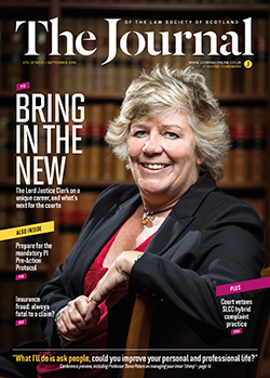MacKenzie boosts Society's AML drive

The latest UK Treasury National Risk Assessment rates the legal sector as at high risk of money laundering. This summer has seen the Law Society of Scotland bolster its position as the designated anti-money laundering (AML) regulator for the Scottish legal sector, by recruiting a new team member for a new audit function.
Graham MacKenzie has spent 15 years in a wide variety of AML, international sanctions and other financial crime-related assurance and audit roles with The Royal Bank of Scotland, Scottish Widows, Lloyds and Sainsbury’s Bank. A main focus of his role will be to establish a new AML audit regime across the Society’s larger member firms, although he will be helping all firms large and small to fulfil AML obligations in a variety of ways, including providing specific guidance and advice and audit services to smaller firms where deemed necessary.
The foundations are already being laid to underpin future work in this space. The Society’s website has been updated with new AML guidance and information, and faculty visits and other talks, presentations and tutorials will be scheduled shortly.
MacKenzie is looking forward to building relationships and working with firms, “hopefully giving straightforward advice in order to tackle a complex issue, making it easier and simpler for our membership to comply with the very strict, but necessary regulation in this area,” he comments, adding: “I hope to bring the knowledge and expertise I’ve built within the financial sector to bear, and apply it to the benefit of our membership – upholding the strong reputation the Scottish legal sector has as a safe, clean place to do business.”
His three top tips to keep your business safe from handling the proceeds of crime:
- The 3 “Ws” – who, what and why? Take a second to pause and think – do the details of the deal/transaction stack up and make sense to you? If not, should you consider making a suspicious activity report?
- Use your common sense – assess the risk of each transaction and each client and undertake an appropriate level of due diligence accordingly.
- Record your decision-making, the rationale and the final result of this assessment. It doesn’t need to be complicated: set up a simple proforma and it will take two minutes each time.
In this issue
- Beyond the named person service
- Sexual harassment: an everyday problem
- Governing Scotland in a federal United Kingdom
- Losing our judgment? (1)
- Reading for pleasure
- Opinion: Alison Reid
- Book reviews
- Profile
- President's column
- The future, step by step
- People on the move
- Changing face of the courts
- Success: the chimp factor
- Courts reform: a call to pre-action
- Teeth that could be sharper
- Good claims, bad lies
- Unlocking doors: demystifying squatting
- Back to basics
- Brexit and IP: what should solicitors be doing now?
- Agency, insolvency and termination
- Brexit and the agricultural sector
- A carnival for some, but not for others
- Scottish Solicitors' Discipline Tribunal
- Culling of the hybrids
- Common property: what policy?
- Cause of action
- Client balances: reminder issued
- Law reform roundup
- From the Brussels office
- Paralegal pointers
- Your Law Society of Scotland Council Members
- At the doors of the court
- Ask Ash
- To the focused, the medals
- Losing our judgment?
- MacKenzie boosts Society's AML drive






